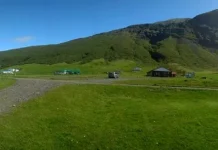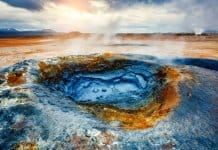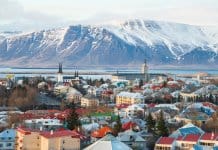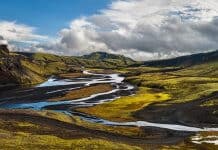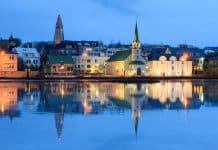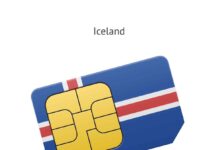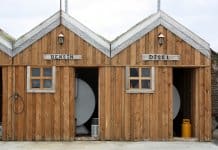Iceland is considered a Nordic European island nation that is located in the North Atlantic and Arctic Oceans. This country has a small population size and has a total area of 103,000 square km (40,000 sq mi). Thus making it the least populated European country.

Is Iceland in the EU?
Iceland is a beautiful island nation with many cultural ties to Scandinavian countries and it is also located in Europe. Considering other Scandinavian countries like Denmark and Sweden have the same Norse origin, is Iceland in the EU? Why is there confusion and what is the debate?
Is Iceland Part of the European Union?
There has been a great debate over this question. Is Iceland is part of the European Union? The short answer is no, Iceland is located in Europe but it is not part of the European Union. However, Iceland is part of the European Economic Area or EEA and with the EEA agreement, some trade deals can occur with the European Union. The EEA includes all EU countries in addition to non-EU countries like Norway, Iceland, and Liechtenstein. Thus those three countries outside of the EU can engage in the EU market.
Iceland has participated in signing EU agreements. Currently, Iceland is a signatory member of the European Free Trade Association (EFTA). As an EEA member Iceland is a non-voting member of certain EU agencies like environmental, educational, and research programs. Iceland also contributes to funds and is actively involved in maintaining peace as a consulting member of EU foreign affairs.
Iceland is part of the Nordic Passport Union, which provides access to the benefits of signing the Schengen Agreement. Therefore, Icelanders and EU citizens can both freely travel, move, work, and study within each EU country.
Ultimately, Iceland has no need to join the European Union. Iceland is already part of the European Economic Area and the EEA Agreement. This allows them to receive benefits of trading with the EU without being an official member state. They already have a relationship where 70 to 80 percent of their exports and imports are with EU countries.
Iceland European Union Membership
Should Iceland join the EU? There is much debate over whether there are benefits to an Iceland European Union Membership. Iceland has its own currency called the Icelandic Krona. There are many factors that contribute to Iceland’s resistance to joining the EU. The number one reason is to protect the fishing industry. Fishing has always been held in high esteem since the start of the original settlers. It is built into the fabric of the culture and economic structure of Iceland. If Iceland became a member state of the EU it would disrupt and cause a negative impact on their fishing industry.

There was an incident with the United Kingdom when a British fishing boat invaded Iceland’s fishing boundaries. They resolved the issue and the fishing boundaries stay clear to this day. However, Iceland wants to preserve their way of life and refuses to join the EU. In addition, Iceland has made strong allies and has developed the alliance to include economic, military and diplomatic benefits. This alliance has made Iceland less reliant on EU countries.
Also, the Nordic and Scandinavian countries are part of the European Free Trade Association (EFTA). In 1960, Iceland, Sweden, Denmark, and Norway became the founding members of EFTA. This organization already protects their economic interests. And since the UK left it might be wiser to maintain status quo and prevent Icelandic membership to the EU.
What is the European Union?
The European Union is economic and political union with 27 member state countries. It was originally 28 EU countries but on 31 January 2020 the United Kingdom officially ended Brexit and left the European Union. The EU’s goals include developing the economies of each country and to avoid conflict. The initial union, the European Economic Community, (EEC) began in 1958 and had only six countries. Those early adopters were Belgium, Italy, France, the Netherlands, and Luxembourg. Since then it has grown to 27 member states. Their EU membership allows them to participate in a large single market or “internal market” for European free trade.
The EU was initially focused solely on economic unity and development however it now looks at policy for various areas. These areas include climate, environmental issues, health, security, justice, and migration. For example, the EU has helped victims of man-made and natural disasters. Therefore, in 1993 they changed the name from the European Economic Community to the European Union.
The EU gave each member of the European Union a single currency, supported economic growth, and mobility. This union has fostered peace, increased living standards, and introduced the euro currency. Nineteen EU countries use the strong euro as currency. The EU is the biggest trade block in the world because it is the world’s largest exporter and importer. Members of the EU can participate in the free movement of goods.
People within the EU can travel easily throughout the continent because border controls don’t exist with the Schengen Agreement. All EU citizens can freely decide where in the EU they want to live, study, work, or retire in leisure. The process for hiring, taxes, and social security must be the same for every EU citizen regardless of country.
What is the Government of Iceland?
Iceland is governed by the Icelandic parliament. The President is the Head of State and the Head of Government is the Prime Minister in a multi-party system. The Icelandic government is the oldest assembly democracy and the first parliamentary system was founded in Thingvellir Park in 930 AD. Power has three branches in Iceland. The government holds and wields executive. Legislative power to uphold Icelandic Law is in the government and parliament, the Althingi. Then the judiciary branch functions independently of the executive and legislative powers. Judicial power is with the Supreme Court and district courts.
The Prime Minister oversees cabinet meetings held twice a week during the parliamentary session. Government Ministers must attend all cabinet meetings. During cabinet meetings, members discuss issues such as government bills and proposals to send to the Althingi.
The Althingi changes every four years by secret ballot to replace 63 members. If you want to be part of the parliament you need to have voting privileges. However, the President and Supreme Court judges cannot be part of the Althingi. Then the President authorizes the leader of the largest political party to create a cabinet of government ministers. They stay in office for four years until the next election. The people choose the President by popular vote after one term of four years. The President can run as many terms as he or she wants if re-elected.
The Independence Party
The Independence Party is the largest party in the Althingi because it has 16 seats. The party formed in 1929 with collaboration between two parties, the Conservative and Liberal parties. This party deeply supports the fishing industry and wealthy citizens. The Independence party therefore supports Icelandic membership of the North Atlantic Treaty Organization but not of joining the European Union.
Is Iceland a Nordic or Scandinavian Country?
It is now very clear Iceland is not part of the European Union. However, is Iceland considered a Nordic or Scandinavian country? There has been a long-standing debate over the distinction. Scandinavian is word that officially includes Sweden, Denmark, and Norway. But sometimes it also includes Finland and Iceland.

So is Iceland part of Scandinavia? It really depends on the people you ask because the answers will vary. Iceland shares many characteristics with Scandinavians linguistically, historically, and even religiously. Many of the original settlers of Iceland were from Norway thus passing down aspects of the Scandinavian culture. Denmark also ruled over Iceland until the 1900s. Many Icelanders believe they are Nordic and Scandinavian.
However, Iceland is very firmly a Nordic country. Nordic countries have a Nordic Council, which includes the three official Scandinavian countries (Sweden, Denmark, and Norway. The council also includes Iceland, Finland, and three regions called Greenland, Faroe Islands, and Åland Islands.
The history of Iceland is interesting and ultimately this island nation is not part of the EU. But they are definitively Nordic and many Icelanders have identified as Scandinavian because of cultural and historical ties.

